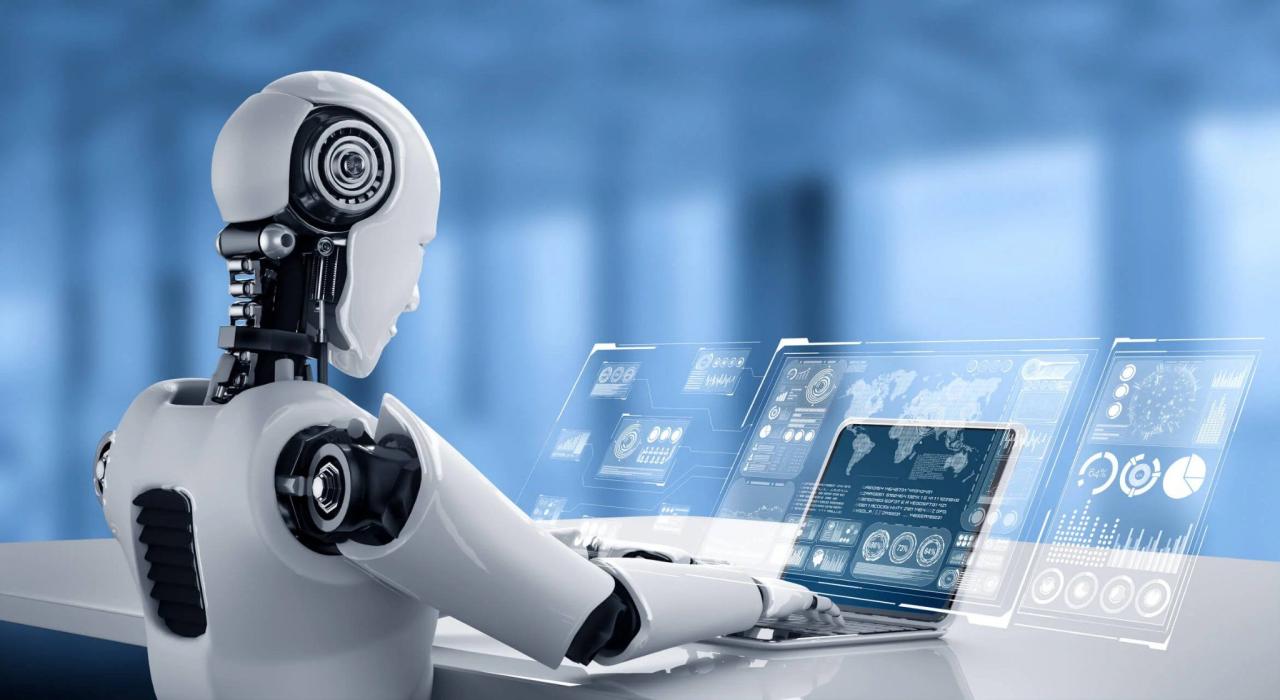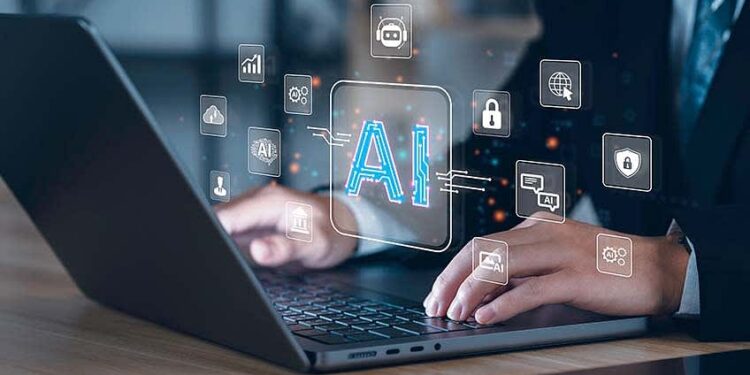The whispers of artificial intelligence are no longer just whispers; they are a roaring chorus echoing through every sector of our global economy. From the nascent stages of simple automation to the breathtaking complexities of deep learning, AI tools are not merely evolving; they are dominating, reshaping the very fabric of how we live, work, and interact. This comprehensive exploration delves into the profound impact of AI, dissecting its current applications, anticipating future breakthroughs, and offering a strategic roadmap for individuals and enterprises eager to harness its unprecedented potential.
The Genesis of Intelligent Systems

To truly appreciate the impending future domination of AI tools, it’s crucial to understand their humble beginnings. The concept of machines mimicking human intelligence has captivated thinkers for centuries, but the practical realization began in earnest in the mid-20th century. Early AI research focused on symbolic reasoning, attempting to encode human knowledge into rules that machines could follow. While limited, these efforts laid the groundwork.
The 1980s saw the rise of expert systems, specialized AI programs designed to emulate the decision-making abilities of human experts in specific domains. Think of early medical diagnostic tools or financial advisors. However, the true inflection point arrived with the advent of machine learning, particularly in the 2000s, propelled by vast datasets and increasingly powerful computational resources. This paradigm shift moved away from explicit programming to systems that could learn from data, identify patterns, and make predictions or decisions without being explicitly programmed for every scenario.
Today, we stand at the precipice of an AI renaissance, fueled by breakthroughs in deep learning, neural networks, and the democratization of AI frameworks. This rapid acceleration is not just a technological marvel; it’s a societal transformation.
Navigating the Current Landscape
The ubiquity of AI tools in our daily lives is often understated, precisely because they are so seamlessly integrated. From the moment we unlock our smartphones to the way we consume content, AI is at play. Let’s explore some key domains where AI tools are already demonstrating their dominance:
A. Business Operations and Efficiency:
I. Customer Relationship Management (CRM): AI-powered CRMs analyze customer interactions, predict purchasing behavior, and personalize communication, leading to higher conversion rates and improved customer satisfaction. Chatbots handle routine inquiries, freeing human agents for complex issues.
II. Supply Chain Optimization: AI algorithms predict demand fluctuations, optimize logistics routes, and identify potential bottlenecks, significantly reducing costs and enhancing delivery times.
III. Financial Services: Fraud detection systems leverage AI to identify anomalous transactions in real-time, protecting both institutions and consumers. Algorithmic trading, credit scoring, and personalized financial advice are also heavily reliant on AI.
IV. Human Resources: AI tools streamline recruitment by sifting through resumes, identifying qualified candidates, and even conducting initial interviews. They can also analyze employee performance data to identify training needs and reduce attrition.
V. Marketing and Sales: Predictive analytics inform targeted advertising campaigns, optimizing ad spend and maximizing reach. Personalization engines recommend products and content tailored to individual preferences, driving engagement and sales.
B. Healthcare and Life Sciences:
I. Drug Discovery and Development: AI accelerates the identification of potential drug candidates, predicts their efficacy and toxicity, and optimizes clinical trial designs, drastically reducing the time and cost associated with bringing new medications to market.
II. Disease Diagnosis and Treatment: AI assists in analyzing medical images (X-rays, MRIs, CT scans) with unparalleled accuracy, often detecting diseases like cancer or retinopathy at earlier stages than human eyes alone. Personalized medicine, tailored to an individual’s genetic makeup, is becoming a reality with AI.
III. Patient Care and Management: AI-powered systems monitor patient vital signs, predict adverse events, and even facilitate remote consultations, improving access to care, especially in underserved areas.
IV. Genomics and Proteomics: Analyzing vast amounts of genetic data to understand disease mechanisms and develop gene therapies is a monumental task made feasible by AI.
C. Creative Industries and Content Generation:
I. Generative AI for Content Creation: Large Language Models (LLMs) can generate human-quality text for articles, marketing copy, scripts, and even entire books. Image generation tools create stunning visuals from simple text prompts, revolutionizing graphic design and advertising.
II. Music Composition and Production: AI can compose original musical pieces, assist in sound design, and even master audio tracks, offering new avenues for artists and producers.
III. Video Editing and Production: AI automates mundane editing tasks, enhances video quality, and even generates realistic special effects, democratizing professional-grade video creation.
IV. Personalized Media Consumption: Streaming services use AI to recommend movies, shows, and music based on viewing habits, enhancing user experience and retention.
D. Education and Learning:
I. Personalized Learning Paths: AI identifies individual student strengths and weaknesses, tailoring educational content and pace to optimize learning outcomes.
II. Automated Grading and Feedback: AI tools can grade essays, quizzes, and even provide constructive feedback, freeing up educators’ time for more impactful teaching.
III. Language Learning: AI-powered language apps offer interactive lessons, pronunciation feedback, and real-time translation, accelerating language acquisition.
IV. Accessibility Tools: AI enables real-time transcription, translation, and text-to-speech functionalities, making education more accessible to individuals with disabilities.
E. Everyday Life and Personal Assistance:
I. Voice Assistants: Siri, Google Assistant, and Alexa are ubiquitous examples of AI tools that manage our schedules, answer questions, play music, and control smart home devices.
II. Navigation and Transportation: AI powers GPS systems, optimizes routes, and is the driving force behind autonomous vehicles, promising safer and more efficient travel.
III. Social Media and Recommendation Engines: AI curates our social media feeds, suggests connections, and recommends content, shaping our online experiences.
IV. Smart Homes and IoT: AI connects and automates devices in our homes, from thermostats to security cameras, creating intelligent and responsive living environments.
Anticipating Future AI Domination
The current state of AI, impressive as it is, is merely a prologue to what’s coming. The future domination of AI tools will be characterized by greater autonomy, more sophisticated reasoning, and seamless integration into every facet of human existence.
A. Hyper-Personalization at Scale:
I. Tailored Experiences: Beyond recommending products, AI will create truly bespoke experiences – from personalized education curricula that adapt in real-time to individually optimized healthcare plans.
II. Dynamic Environments: Our physical and digital environments will dynamically adapt to our preferences and needs, based on continuous AI analysis of our behavior and context.
B. Autonomous Systems and Robotics:
I. Advanced Robotics: Robots will move beyond controlled factory environments, operating autonomously in complex, unstructured settings like homes, hospitals, and outdoor spaces, performing tasks ranging from elder care to environmental monitoring.
II. Self-Optimizing Systems: Entire systems, from city traffic management to energy grids, will be managed and optimized by AI, reacting to real-time data and anticipating future needs.
III. Enhanced Manufacturing: AI-driven robots and predictive maintenance will lead to fully autonomous factories with unprecedented efficiency and minimal waste.
C. Scientific Discovery and Innovation Acceleration:
I. Accelerated Research: AI will not only analyze existing data but also formulate hypotheses, design experiments, and interpret results in fields like material science, astrophysics, and climate modeling, dramatically accelerating scientific discovery.
II. New Materials and Therapies: AI will design novel materials with desired properties and discover entirely new therapeutic approaches for previously intractable diseases.
III. Space Exploration: AI will analyze astronomical data, guide autonomous probes, and assist in identifying habitable exoplanets, pushing the boundaries of space exploration.
D. Human-AI Collaboration: The Augmented Human:
I. Intelligent Assistants: AI tools will evolve beyond simple voice assistants to become true cognitive partners, anticipating our needs, assisting with complex problem-solving, and augmenting our intellectual capabilities.
II. Skill Augmentation: AI will allow individuals to perform tasks requiring specialized skills without years of training, democratizing access to complex professions.
III. Creative Augmentation: AI will serve as a powerful co-creator for artists, writers, and musicians, offering suggestions, generating variations, and handling technical aspects, allowing humans to focus on conceptualization and emotional depth.
E. Ethical AI and Responsible Development:
I. Bias Mitigation: Future AI development will prioritize robust methodologies for identifying and mitigating algorithmic bias, ensuring fairness and equity in AI applications.
II. Transparency and Explainability: Efforts will focus on creating more transparent AI models that can explain their decision-making processes, building trust and accountability.
III. Privacy-Preserving AI: New techniques will emerge to allow AI to learn from data while preserving individual privacy, addressing critical societal concerns.
Strategies for Embracing the AI Revolution

The impending domination of AI tools is not something to fear, but rather an opportunity to seize. Both individuals and organizations must strategically adapt to thrive in this evolving landscape.
A. For Individuals:
I. Upskill and Reskill: Focus on developing skills that complement AI, such as critical thinking, creativity, emotional intelligence, and complex problem-solving. Learn to work with AI, not against it.
II. Embrace Lifelong Learning: The pace of technological change demands continuous learning. Stay updated on AI trends, tools, and best practices.
III. Understand AI Ethics: Develop an awareness of the ethical implications of AI, including bias, privacy, and accountability. This knowledge will be crucial for responsible engagement with AI.
IV. Experiment with AI Tools: Get hands-on experience with various AI tools available today. Familiarity breeds comfort and insights into their potential.
V. Cultivate Adaptability: The future will be characterized by constant change. Be open to new ways of working and thinking.
B. For Organizations:
I. Develop an AI Strategy: Don’t implement AI haphazardly. Create a clear strategy that aligns AI initiatives with business objectives, identifying specific problems AI can solve.
II. Invest in Data Infrastructure: AI thrives on data. Ensure you have robust data collection, storage, and governance frameworks in place. Clean, well-structured data is paramount.
III. Foster an AI-Ready Culture: Encourage experimentation, learning, and collaboration around AI. Provide training for employees across all departments.
IV. Start Small, Scale Big: Begin with pilot projects to test AI solutions, learn from failures, and then scale successful initiatives across the organization.
V. Prioritize Ethical AI Development: Implement guidelines for responsible AI development, focusing on fairness, transparency, and accountability. Engage with legal and ethical experts.
VI. Focus on Human-AI Collaboration: View AI as an augmentation tool for your workforce, empowering employees to achieve more, rather than a replacement. Re-skill your human talent to leverage AI effectively.
VII. Build or Acquire AI Talent: Invest in recruiting data scientists, machine learning engineers, and AI strategists, or partner with AI specialized firms.
The Imperative of Responsible AI Development
As AI tools move towards future domination, the imperative for responsible development intensifies. The power of AI brings with it significant ethical considerations that must be addressed proactively.
A. Bias and Fairness:
I. Data Bias: AI models learn from the data they are fed. If this data reflects existing societal biases, the AI will perpetuate and amplify those biases, leading to unfair outcomes in areas like hiring, lending, or criminal justice.
II. Algorithmic Bias: Even with unbiased data, the algorithms themselves can introduce bias. Developers must rigorously test and audit models for fairness across different demographic groups.
B. Privacy and Data Security:
I. Data Collection: The vast amounts of data required to train AI models raise serious privacy concerns. Robust data anonymization and privacy-preserving AI techniques are crucial.
II. Security Vulnerabilities: AI systems can be vulnerable to adversarial attacks, where malicious actors manipulate inputs to cause incorrect outputs, highlighting the need for robust security measures.
C. Accountability and Transparency:
I. Explainability: When an AI makes a critical decision (e.g., denying a loan or diagnosing a disease), it’s vital to understand why it made that decision. “Black box” AI models pose a challenge to accountability.
II. Human Oversight: Even highly autonomous AI systems should have human oversight mechanisms to intervene in case of errors or unforeseen circumstances.
D. Job Displacement and Economic Impact:
I. Workforce Transformation: While AI creates new jobs, it will undoubtedly automate some existing ones. Society must proactively address this by investing in education, re-skilling programs, and exploring new economic models.
II. Wealth Concentration: There’s a risk that the benefits of AI could disproportionately accrue to a few, exacerbating wealth inequality. Policy frameworks are needed to ensure a more equitable distribution of AI’s economic gains.
E. Misinformation and Malicious Use:
I. Deepfakes: The ability of AI to generate realistic synthetic media (deepfakes) poses a significant threat to trust and can be used for misinformation or malicious purposes.
II. Autonomous Weapons: The development of lethal autonomous weapons systems raises profound ethical dilemmas that require international debate and regulation.
Addressing these challenges requires a concerted effort from governments, industry, academia, and civil society. Establishing ethical guidelines, fostering international collaboration, and developing robust regulatory frameworks will be essential to ensure that AI’s domination benefits all of humanity.
Conclusion
The journey towards a future dominated by AI tools is not just a technological progression; it’s a profound societal evolution. From optimizing business operations and revolutionizing healthcare to fueling scientific discovery and transforming our personal lives, AI’s influence is expansive and growing. The current applications are merely a glimpse into a future where intelligent systems become indispensable partners, augmenting human capabilities and solving complex global challenges.
Embracing this future requires proactive engagement. For individuals, it means cultivating adaptability, continuously learning, and developing uniquely human skills that complement AI. For organizations, it demands strategic investment, cultural transformation, and a commitment to responsible implementation. The ethical considerations are paramount, demanding vigilance in addressing bias, safeguarding privacy, and ensuring accountability.
As AI tools continue their ascendancy, they will undoubtedly reshape industries, redefine jobs, and alter the very nature of human interaction. The “future domination” of AI is not a dystopian vision but a powerful opportunity – an opportunity to unlock unprecedented levels of efficiency, innovation, and progress. By navigating this revolution with foresight, collaboration, and a deep commitment to ethical principles, we can ensure that this intelligent future is one that empowers, enriches, and benefits all of humanity.











Discussion about this post